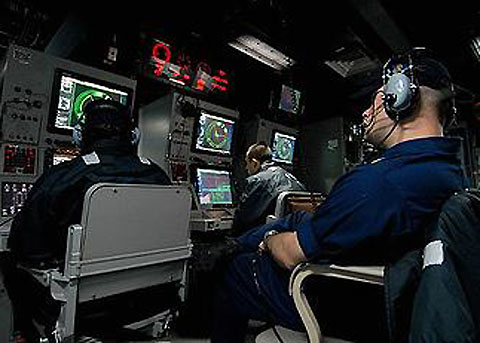www.islandbreath.org ID# 0817-02
SUBJECT: NAVY SONAR & WHALES
SOURCE: DIANA LEBEDZ mpalmer@cal.net
POSTED: 4 FEBRUARY 2008 - 9:00pm HST
Federal Judge Overturns Bush Sonar Waiver

image above:Navy sonar technicians monitor screens. Photo by James R. Evans.
A federal court today struck down a waiver issued by the White House that would In nullifying the waiver, U.S. District Court Judge Florence-Marie Cooper reaffirmed an injunction issued early in January, requiring the Navy to reduce harm to whales and other marine mammals from sonar training. The Navy has acknowledged that the high-intensity, mid-frequency sonar at issue can injure and kill whales and other marine mammals. |
SUBJECT: NAVY SONAR & WHALES
SOURCE: MARK PALMER mpalmer@cal.net
POSTED: 28 JANUARY 2008 - 8:00am HST
Editorial opinions on sonor ban lift

image above: Navy patch for USS Pom Pon, a radar picket ship joins creatures of the sea and military
by Mark Palmer on 26 January 2008 Plus the New York Times and Los Angeles Times have come out with very nice editorials. Bush's sonar order is unconstitutional by Kenneth R. Weiss on 23 January 2008 in The Los Angeles Times The California Coastal Commission argued in federal court Tuesday that President Bush violated the U.S. Constitution by trying to overturn a court order that restricted the Navy's use of a type of sonar linked to the deaths of marine mammals. The commission's attorneys said Bush's move to exempt the Navy sonar training exercises in Southern California waters from federal law violated the Constitution's separation-of-powers doctrine. "The notion that the president can act like some medieval autocrat and impose the law as he sees it violates the fundamental basis of the American Constitution," said Atty. Gen. Jerry Brown, whose staff lawyers represent the commission. "There are three branches of government. Each of the branches has to be respected." President Bush issued an order last week that tried to overturn a ruling by a federal judge in Los Angeles who had directed the Navy to avoid conducting its sonar exercises within 12 miles of the coast and in the area between Santa Catalina and San Clemente islands, places where whales and dolphins are abundant. The president justified his decision as a matter of national security, saying it was of paramount interest for the United States to train sailors to use mid-frequency active sonar to hunt for quiet diesel-electric submarines operated by potentially hostile countries in areas such as the Persian Gulf. But Bush provided only a "cursory basis" for his decision and did not provide an explanation from the Secretary of Commerce, as required for an exemption to the Coastal Zone Management Act, the state attorney general's office argued. Without such an explanation, Bush seems to be countermanding a judicial opinion simply because he does not agree with it, the court papers argue. "He can appeal it," Brown said. "He can appeal it twice, to the [U.S.] Supreme Court. . . . But he cannot say he's above the law and invoke the idea of national security and do whatever he wants." A U.S. Justice Department lawyer handling the case for the president and the Navy declined to comment. So did Navy Cmdr. Jeff Davis, who said Navy lawyers would respond in court Friday. Carl Tobias, a University of Richmond law school professor, said the Coastal Commission had raised a provocative argument that he expected to have ramifications on future conflicts that arise between national security and environmental protections. "It's totally uncharted territory," Tobias said. Tobias said Bush did not seek the exemption until after a court had weighed the government's national security arguments and ruled that some environmental protections nonetheless were warranted. Peter Douglas, executive director of the Coastal Commission, said his agency wasn't seeking to set constitutional precedent but to do its job of protecting coastal and marine resources. "The commission is doing this because we feel so strong that the commission action allows the Navy to conduct its exercises while providing reasonable protections to marine mammals," Douglas said. Whales in the Navy’s Way Editorial on 22 January 2008 in The New York Times According to a federal district judge in California, the Navy’s own research predicted that its sonar training exercises off the California coast will cause widespread harm — and possibly permanent injury or death — to nearly 30 species of marine mammals, including five species of endangered whales. That still didn’t stop the Bush administration from rejecting the judge’s carefully crafted plan to protect these animals from avoidable harm. There is little doubt that the Navy’s mid-frequency active sonar is an effective tool for locating quiet-running submarines and that training is needed in shallow, offshore waters where sound propagates differently than in the open ocean. The rub is that the sonar, which generates extremely intense underwater sound, is harmful to marine mammals that depend on their own sensitive acoustical systems to feed, communicate and navigate. The waters off Southern California are teeming with vulnerable species. Early this month, Judge Florence-Marie Cooper issued a tough set of mitigation measures — such as shutting off the sonar when mammals are too close — that the Navy must take to avoid a ban on its training activities. That seemed reasonable, especially given the Navy’s own analysis of the potential harm. Last Wednesday, however, President Bush attempted to override the court order by granting the Navy waivers, on national security grounds, from two environmental laws on which the decision was based. That led the judge to stay some restrictions while leaving others in place. Now the fight will resume in court over whether the White House overstepped its authority in granting the waivers. From our perspective this looks less like a matter of national security than of convenience for the Navy, which resists efforts to constrain its activities no matter the harm to marine life. Save the whales from the Navy Editorial on 26 January 2008 in The Los Angeles Times A Navy end-run around a ruling to limit its sonar test is an attack on the Constitution. |
SUBJECT: SUPERFERRY & MILITARY
SOURCE: MARK PALMER mpalmer@cal.net
POSTED: 23 JANUARY 2008 - 8:30am HST
Bush, then Judge, exempt Navy

image above: Navy emblem "The Sea is Ours" from supplier McGrogan's Patch Design
| Judge sets aside some restrictions on sonar by Kenneth R. Weiss on 18 Janury 2008 in the Los Angeles Times A federal judge in Los Angeles on Thursday temporarily set aside some of the tough restrictions on upcoming naval exercises off Southern California that employ a type of sonar linked to the injury and death of whales and dolphins. The decision by Judge Florence-Marie Cooper defers to President Bush, who moved earlier this week to exempt the Navy's exercises from environmental laws that formed the basis for a long-running court case between the Pentagon and environmentalists. But Cooper granted only two concessions to Bush and the Navy, signaling that she will consider arguments next week from conservation groups that are urging her to hold her ground on more stringent safeguards. "We are pleased," said Cmdr. Jeff Davis, a Navy spokesman. "This ruling means that the USS Abraham Lincoln carrier strike group will be able to start the exercise next week without two restrictions that threatened the realism of our training." The Navy says it must train personnel to detect quiet diesel-powered submarines that are deployed in worldwide hot spots such as the Persian Gulf. Although lawyers for the Navy have vigorously protested nearly all of Cooper's safeguards, they asked her to temporarily set aside the two they considered the most intrusive: requirements to shut down sonar if a marine mammal ventures within 2,200 yards of a sonar device, and to reduce sonar power under certain sea conditions that allow powerful sonar blasts to travel farther than normal. After months of inquiry, a visit to Navy ships and analysis of scientific literature, Cooper ruled Jan. 3 that these and other measures were needed to safeguard whales from the potentially debilitating effect of the powerful sound waves. Under her order issued Thursday, the Navy will have to comply with other safeguards, such as staying away from the waters between Santa Catalina and San Clemente islands as well as those within 12 nautical miles of the coast. These are areas known for their abundance of marine mammals. To comply with the order, the Navy will also have to step up its surveillance for whales before and during exercises, deploying specially trained spotters aboard ships and aircraft. It will have to reduce power when marine mammals are spotted within about 1,000 yards and shut down if the mammals come within about 200 yards. Meanwhile, conservation groups began working on legal arguments they hope will convince the judge that Bush has not followed the law in waiving environmental law on the grounds of national security and an urgent need to train sailors. "We remain optimistic that we will prevail in opposing the waivers," said Joel Reynolds, a senior attorney with the Natural Resources Defense Council. "It's an abuse of the term 'emergency' and flatly inconsistent with the National Environmental Policy Act." Navy Gets Temporary Sonar Reprieve by The Associated Press on 18 January 2008 A federal judge on Thursday temporarily lifted some restrictions on the Navy's use of high-power sonar during training exercises near Southern California after President Bush got involved in the case. The order allows the Navy to continue sonar use when whales or other mammals are spotted within 2,200 yards, and its ships do not have to reduce power during conditions when temperatures cause sound to travel farther than it would otherwise. The Navy still must maintain a 12-nautical-mile, no-sonar zone along the coast as part of a preliminary injunction issued earlier this month when U.S. District Judge Florence-Marie Cooper ruled that using mid-frequency active sonar violated the Coastal Zone Management Act. The president exempted the Navy from that environmental law on Tuesday, but it remained up to court to allow the anti-submarine warfare training to go forward because the injunction. The use of high-frequency sonar remains controversial. Scientists say loud sonar can damage marine mammal brains and ears. But much is still unknown about how sonar affects whales and other marine mammals. For example, the sound can hurt some species while not affecting others, and experts don't fully understand why. A three-judge panel of the 9th U.S. Circuit Court of Appeals in San Francisco had been expected to rule on the injunction on Friday, but after Bush's action, the appeals court sent the matter back to the district court. ''We are pleased with the District Court's decision,'' said Cmdr. Jeff A. Davis, a Navy spokesman. ''This ruling means that the USS Abraham Lincoln carrier strike group will be able to start the exercise next week without two restrictions that threatened the realism of our training.'' The Navy has said the exercises are vital and that it works to minimizes the risk to marine life. A statement from the Defense Department said that the Navy already applies 29 measures to mitigate the effects. The Natural Resources Defense Council, which has been fighting the Navy's sonar training, has said it was determined to oppose the matter. Cooper asked the Navy and the NRDC to file arguments next week for her to consider. Cooper did not put a specific time frame on the temporary stay. Still, ''It's a very limited partial stay for a brief period of time,'' said Joel Reynolds, a senior attorney and director of the Marine Mammal Protection Project with the council. Conservationists and politicians have sharply criticized Bush. U.S. Sen. Barbara Boxer D-Calif., chairman of the Senate Committee on Environment and Public Works, called it a ''misguided decision.'' ''Once again the Bush administration has taken a slap at our environmental heritage, overriding a court that was very mindful to protect marine wildlife, including endangered whales, while assuring that the Navy's activities can continue,'' she said. White House Exempts Navy From Sonar Ban The Bush administration jumped into a long-running legal fray in California on Tuesday, exempting the Navy from a law that environmental groups have used to prevent the use of a type of powerful sonar that is believed to harm whales. The White House and the Whales by Andrew C. Revkin on 16 January 2008 in The New York Times The fight over how humans should, and should not, interact with whales has moved from the waters off Antarctica, where environmental campaigners have been harassing Japanese whalers, to the White House. While traveling in the Middle East on Tuesday, President Bush issued an exemption to the Navy from environmental laws that would otherwise limit its ability to use certain kinds of sonar used in anti-submarine warfare training, the Associated Press said. Last August, the Natural Resources Defense Council persuaded a federal judge in Los Angeles to order a stop to Navy training exercises off Southern California using medium-range sonar. The judge said that the Navy’s own assessments predicted that dozens of marine mammals, particularly deep-diving whales, could be harmed by the intense sound waves. In January, a fresh injunction was issued by the court requiring the Navy to establish a 12-nautical-mile, no-sonar zone along the coast and to post lookouts for marine mammals. The A.P. quoted a White House memorandum as saying, “The Navy training exercises, including the use of sonar, are in the paramount interest of the United States…. This exemption will enable the Navy to train effectively and to certify carrier and expeditionary strike groups for deployment in support of worldwide operational and combat activities, which are essential to national security.” Environmental campaigners and California officials sharply attacked the decision in a joint news release today. “There is absolutely no justification for this,” said California Coastal Commissioner Sara Wan. “Both the court and the Coastal Commission have said that the Navy can carry out its mission as well as protect the whales. This is a slap in the face to Californians who care about the oceans.” “The president’s action is an attack on the rule of law,” said Joel Reynolds, director of the Marine Mammal Protection Project at the Natural Resources Defense Council. “By exempting the Navy from basic safeguards under both federal and state law, the president is flouting the will of Congress, the decision of the California Coastal Commission and a ruling by the federal court.” The Navy makes its case both for the importance of the sonar and its efforts to limit risks to marine mammals on a Web site here. |
see also:
Island Breath: TGI#12 - Navy Plans for the Pacific 9/3/07
Island Breath: Navy Expansion Plan for PMRF 8/7/07
Island Breath: Rimpac 2006 Impact 7/9/06